Last week, by the courtesy of His Highness Sheikh Mohammed bin Rashid Al Maktoum, the Prime Minister of the UAE, MBA students from IESE and other three leading business schools—LBS, Harvard and Wharton—attended the 4th edition of the World Government Summit. Held in Dubai, the event welcomed 53 students from five continents and more than 20 countries, making the word “world” in its title very fitting.
In the following lines, we will explore why this wasn’t a regular conference and the deep impact it had on our business education. The trip to Dubai wasn’t just to learn from thought leaders in their respective fields, it was also to interact and participate in several different ways. We definitely agree with something that was said on the opening day: “We want to impact the future, we don’t want the future to impact us.”
MBA students from IESE and other three leading business schools—LBS, Harvard and Wharton—attended the 4th edition of the World Government Summit
What Is the World Government Summit?
The conference is part of an on-going effort of Dubai’s Prime Minister Office to “set the agenda for the next generation of governments with a focus on how they can harness innovation and technology to solve universal challenges facing humanity.” It’s the “intersection between government, futurism, technology and innovation.”
Although it is an important world event by its own merit, the summit gains further weight by having the support—and actual presence—of the heads of organizations like the United Nations, the World Bank, the OECD and the League of Arab States, and world leaders like U.S. President Barack Obama.
The three-day summit, dedicated to the immediate, medium- and long-term future, featured discussions on topics like education, health, innovation and technology, the world economy and human capital. We could easily write a very long brief on the summit, but prefer to share what the experience meant for us as students.
A Student’s Perspective of the Summit
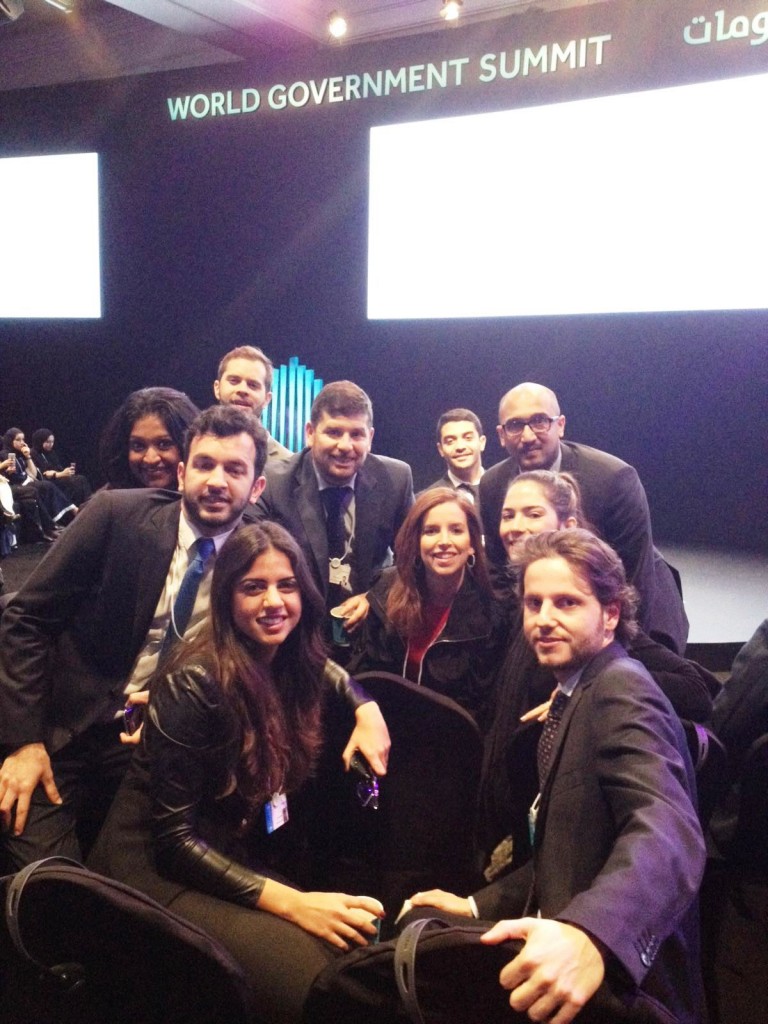
Some of the IESE MBA students who attended the Summit
In class, it is often said that business doesn’t “occur in a vacuum” since firms also have to deal with governments and society. This trilogy can cause you serious trouble or it can help to foster your business. It’s interesting to note that many business schools frequently speak of industries and cases that happened in the past, yet dedicate little time to think about the future of industries, business and the world as a whole.
This summit was the perfect combination of these three worlds: we had the chance to look into the future of the most revolutionary industries and think about what kind of governments our countries require to successfully address the challenges of a new world economy, while always bearing the common good.
For a large majority of the four delegations, the summit provided the opportunity to visit and experience the Emirates for the first time. The amazing hospitality of the people, the country’s potential for growth and its efforts to move beyond being just an “oil-producing economy” will certainly reap its benefits. As Arif Naqvi, the CEO of Abraaj Group, said, “Governments must disrupt themselves to stay on top of the game.” We are sure that EUA has one of these governments.
We had the chance to look into the future of the most revolutionary industries and think about what kind of governments our countries require to successfully address the challenges of a new world economy, while always bearing the common good
Not Just Spectators
The organization is conscious of the relevant role that MBA students play as ambassadors once they are back in their countries and industries. For this reason, they kindly included some of the students to participate in the various panel discussions. Students had the chance to share the floor with outstanding personalities in their field of interest.
Arjun Rajagopal, a second-year IESE MBA student, participated in the “Imagining the Future of Government” panel, which explored how changes in the way we communicate and new technologies are affecting governments and what they should do to engage their citizens.
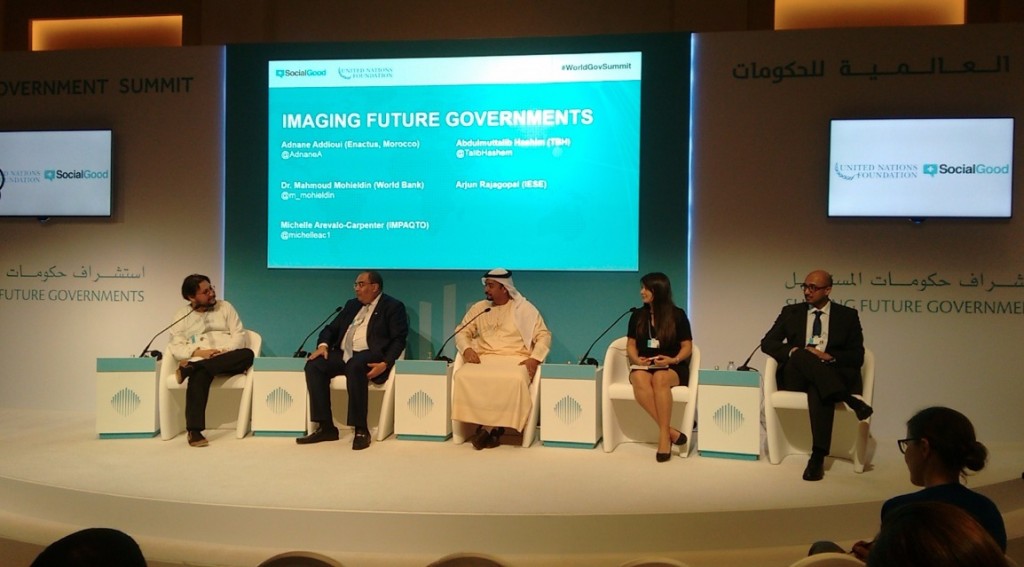
Arjun said, “The panel brought together a variety of perspectives, including those of civil society, inter-governmental and non-governmental organizations. Macro-level issues, such as demographics and national policy harmonization, were linked to micro-level issues, like local services and community engagement. The conversation reminded me that ‘government’ operates at different levels and that sustainable development requires engagement at all of these levels.”
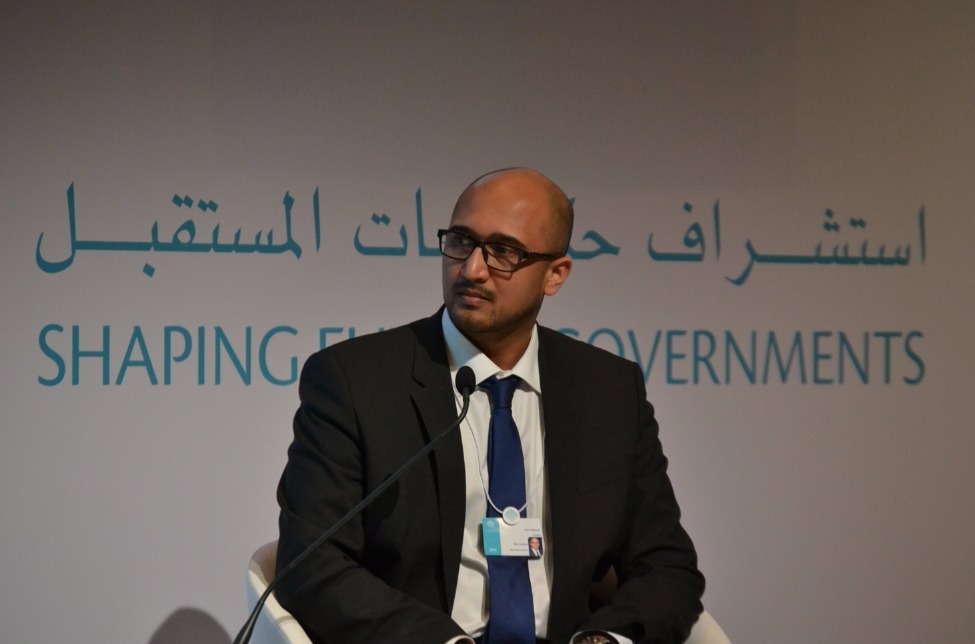
Arjun Rajagopal, MBA Class of 2016
Inspiring: Meet the People Who Shape the World
Technology can offer us a front-row seat to the most inspiring speeches on earth and even give us a 360º view, but it still falls short when it comes to human interaction with exceptional personalities.
The summit offered that kind of opportunity: a platform for future business leaders to meet and talk with renowned political personalities like Paul Kagame, the President of Rwanda; Felipe Calderón, the former President of Mexico; and Nobel Laureate Muhammad Yunus, whose microfinance lending model has improved the lives of millions around the world.
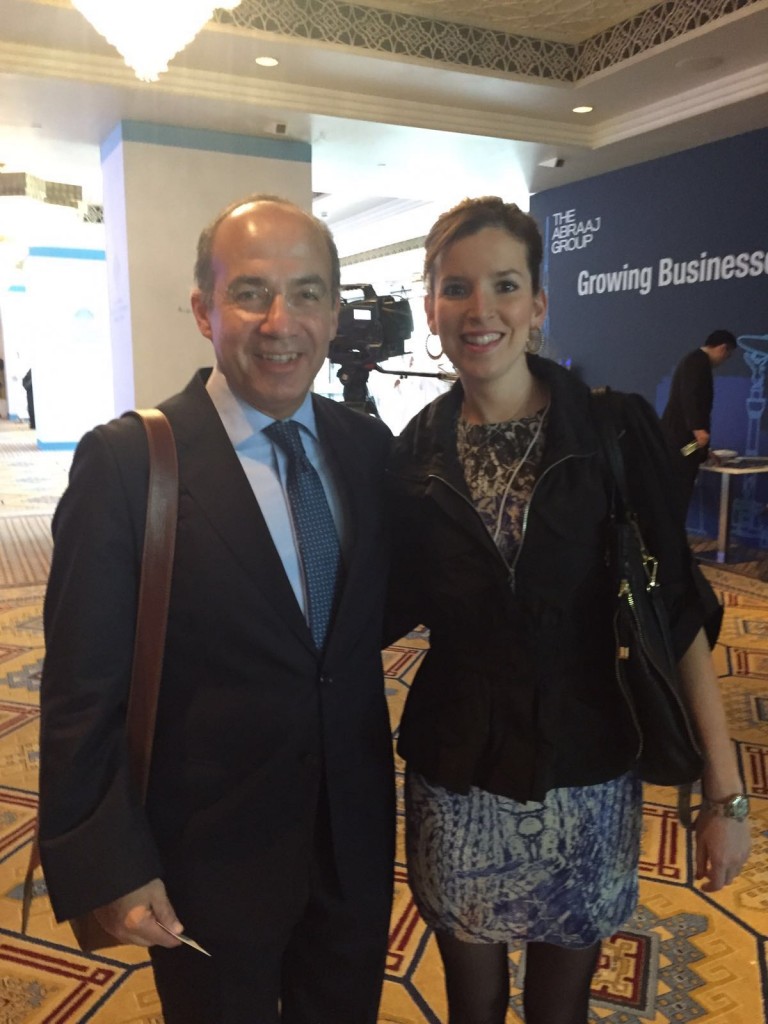
Felipe Calderón, former President of Mexico
But the highly renowned names were not our only inspiration. The list could easily include the other 100-plus speakers who were invited, but just to name a few: Nicolas Cary, co-founder of BlockChain, in the technological area; Dr. Anthony Atala in the medical field; and H.H. Sheik Ahmed Bin Saeed Al Maktoum, the CEO of Emirates Airlines, in the business management sphere.
A common view shared among the students was how the extra minutes after the speeches and the coffee chats in the networking areas made us realize how similar these world personalities are to us: they are regular people who have achieved outstanding accomplishments in the world with only two common principles: a strong will and an even stronger commitment.
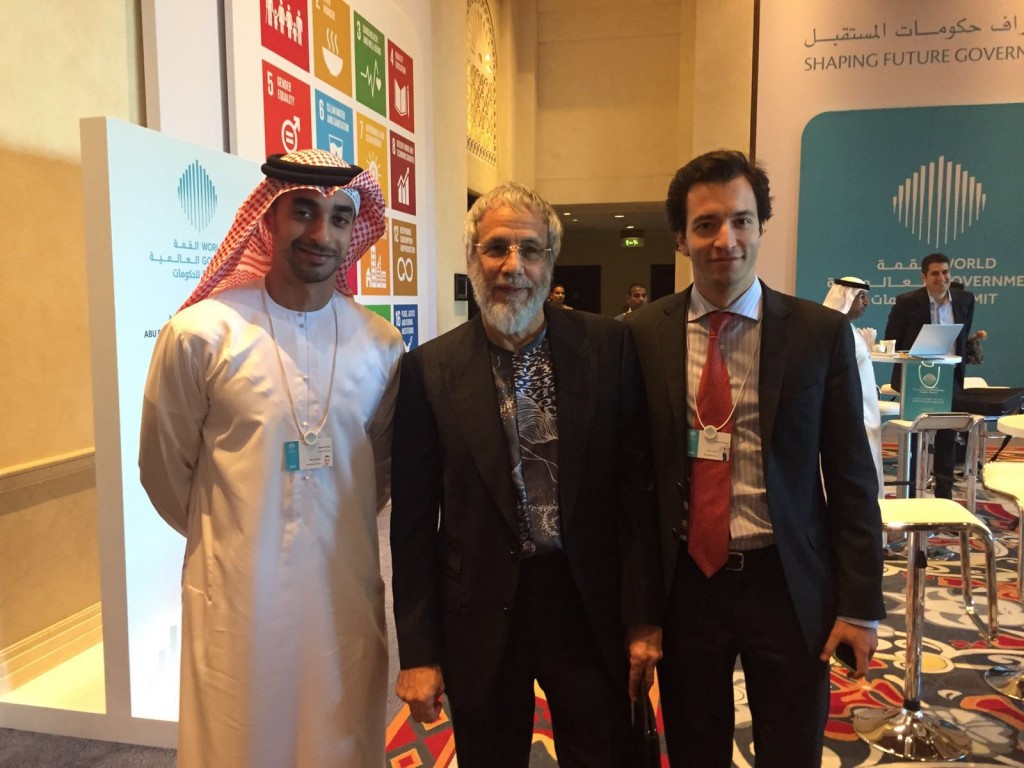
Two IESE MBA students with YIslam, formerly known as Cat Stevens
Personal Experience & Closing Remarks
As MBA students, for two years we are urged to think about “our future” as individuals, but this time we had the opportunity to think about “our common future,” which goes beyond our industries and countries to include the world and the well being of mankind.
It is certainly difficult to think in broad terms about the future, and even more difficult to take time out from attending real problems to try to solve others that we think are in the making. We would like to highlight the commitment of the Prime Minister’s Office for taking the effort to look into the future on such a broad and deep level.
As MBA students, for two years we are urged to think about “our future” as individuals, but this time we had the opportunity to think about “our common future”
The summit served not merely as a call to reflect on these issues, but rather it was a call to act on them. We observed the UAE’s commitment to this call when, during our stay, the 22-year-old Shamma Al-Mazrui was appointed as Minister of Youth and a Ministry of Happiness was announced.
From a business perspective, we now have the challenge to, as Klaus Schwab said, “Move from capitalism to talentism”.


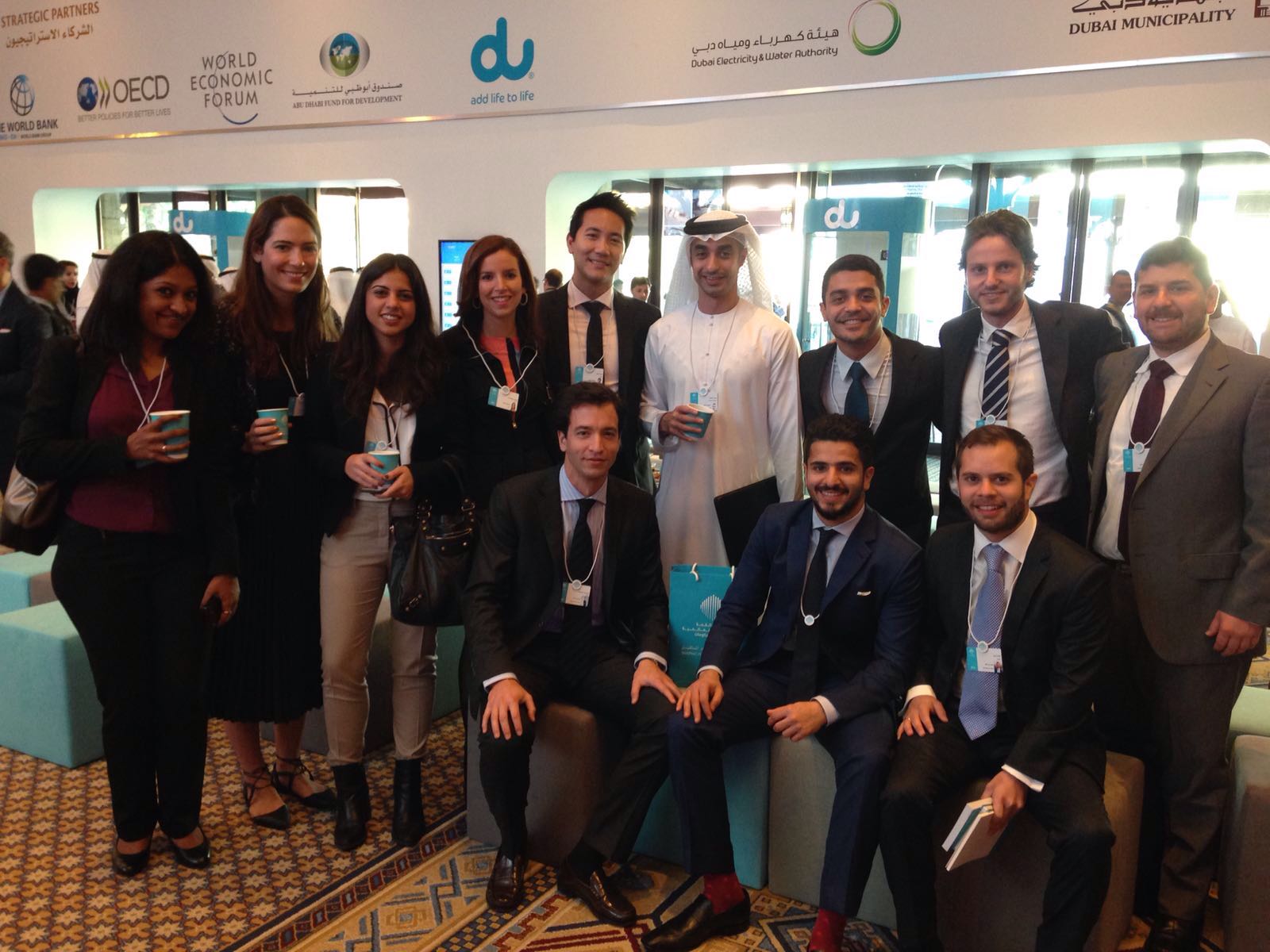

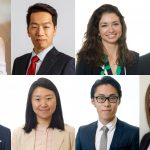
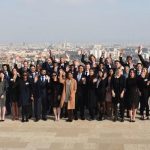

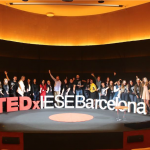
Hi Sergio, its a good article which you have explained “Move from capitalism to talentism” a super way..
it was an amazing experience, can take part in the extraordinary conference
Nice article Sergio…thanks for share.
thanks for share
Very amazing group pics. Nice to see all together.
Nice post.I have shared a great inspirational story with us.Thanks for sharing this with us.
This was my first visit and turned out to be very helpful.
Thanks for sharing the article was very nice and interesting to us, may be helpful and useful.
Thanks once again
Thanks Already Sharing You